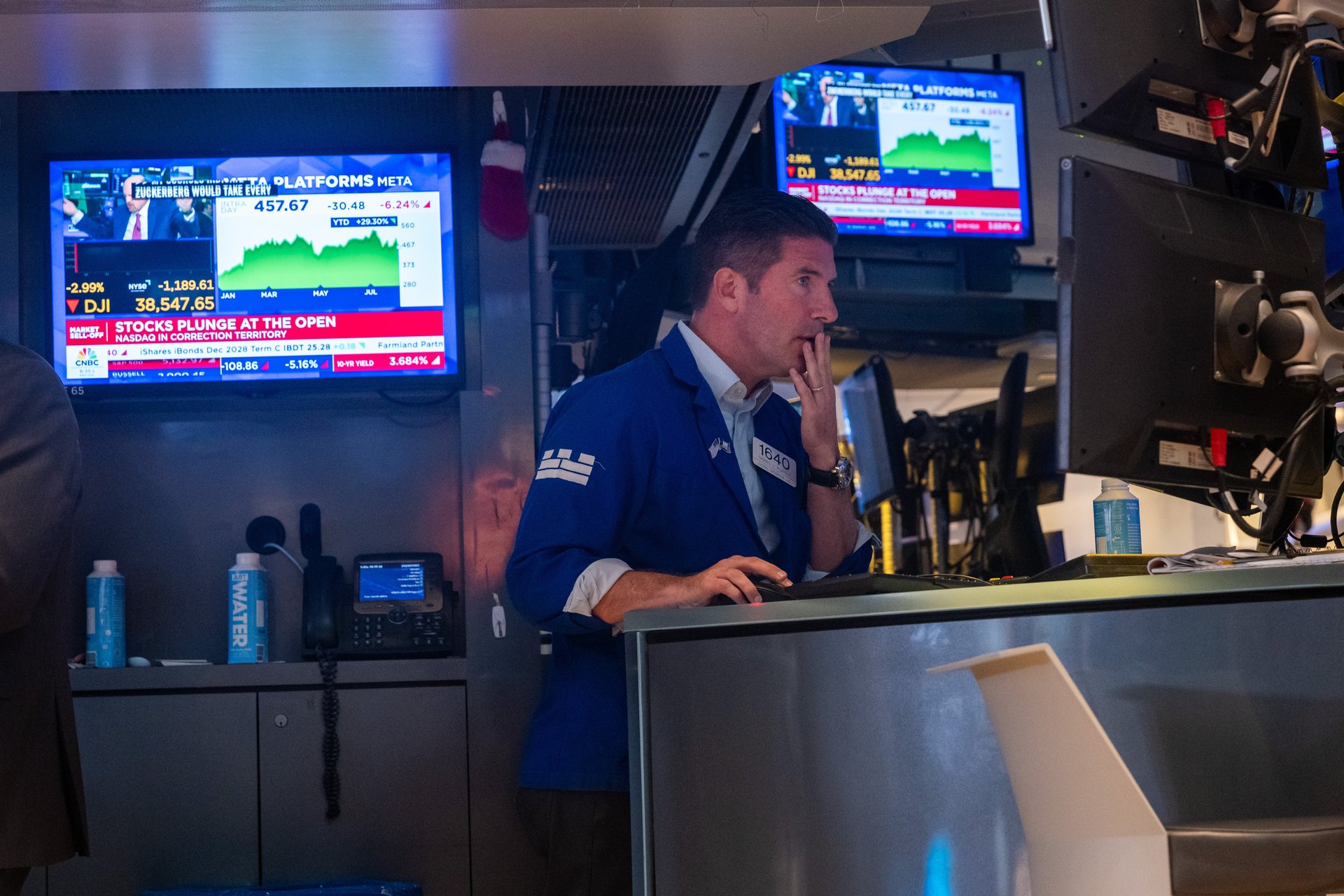Buy Amazon, AI infrastructure, and aerospace stocks even though a recession is likely, strategist says
Tim Urbanowicz, Head of Research and Investment Strategy at Innovator ETFs, discusses how to spot opportunities amid a turbulent stock market

Tim Urbanowicz, Head of Research and Investment Strategy at investment firm Innovator ETFs, spoke with Quartz for the latest installment of our “Smart Investing” video series.
Suggested Reading
Watch the interview and check out the transcript below. The transcript of this conversation has been lightly edited for length and clarity.
Related Content

ANDY MILLS (AM): The indices dropped the most that they have in a couple years on Monday. What’s going on?
TIM URBANOWICZ (TU): I think it’s really all about the investors walking back. This confidence that they had in the soft landing being consensus, and this is something we’ve been saying for a while now — it always looks like the soft landing is coming when the Fed tightening cycle comes to an end, and it rarely plays out. So we’ve seen some violent moves over the last couple days, Monday especially. But we really view this as pretty healthy and puts us at a more realistic point for where we’re at in this cycle right now.
And really, the pullback thus far has been entirely driven by valuations contracting, okay? And that’s just, again, that confidence being walked back. What we think is really important to be paying attention to right now is more the earnings side of the equation, and earnings expectations still remain very, very high. If I look over the next year, 10% growth, 13% growth the year after, that’s very inconsistent with what we’ve seen historically near the end of tightening cycles. There’s always a period where earnings take a hit. The hard landings tend to be more extreme. The soft landings tend to be more a blip, but we still see that hit and we tend to see the bottom about two years after that final hike. So that’s really what we think investors need to be paying attention to right now.
AM: Gotcha. So should investors be concerned about a recession?
TU: I think it’s definitely a possibility. It’s probably a high possibility. I do think if we look at some of the action that we’ve seen in the bond market over the last couple days, we look at what’s expected from the Fed. It’s definitely a bit of an overreaction. The economy’s slowing, it’s not falling off a cliff. And when I look out there and I see the expectations from the market being a 50 basis point cut priced in September, another 50 basis point cut in November and a 25 basis point cut in December, that’s more extreme than the situation we’re seeing play out on the surface. To contextualize that, Andy, that is actually more extreme than what we saw for the cut cycle kicking off the global financial crisis. So, this is not 2008. Yes, the economy’s slowing, but it’s not blowing up.
AM: Yeah. I’ve never seen a faster pivot from Wall Street to like, oh, cut now and cut way more than you thought.
TU: Oh, I’m seeing commentators now saying, hey, we’re gonna see an emergency 50 basis point cut today or tomorrow. We’re not there. Again, it’s slowing. It’s not falling off a cliff.
AM: Yeah. And during the financial crisis, there was quite a bit of pullback before the Fed stepped in and were doing emergency cuts. I don’t know if they would do it differently this time. Do you think they would?
TU: Well, I think if we got to that point, but we look out there and we see a very different picture. There’s not the excessive leverage that you see in the system. The consumer is weakening, but they’re still in decent shape. Lending standards, they’re tight, but they’re not extreme. So that’s all a good thing. And again, if we do see a recession, which is likely, it’s probably going to be pretty shallow and investors should really start thinking about what is the portfolio we wanna hold heading into the next bull market because this is gonna be an opportunity for that.
AM: So a likely shallow recession. What should investors do then?
TU: Well, I think it’s starting to allocate to pockets of the market where valuations are starting to become more attractive. And if we look out there right now in the short run, we see opportunities in areas where demand isn’t gonna be hit heavily. So think high quality stocks. One, we look at a lot of the AI infrastructure plays. This is not an area where companies are gonna start slowing spending down, even if the economy sells off aerospace and defense stocks. Same story here. This is not an area that’s gonna be impacted by an impending recession and economic slowdown. So, in the short run, we think those are areas where investors should start considering.
But also, longer term, it’s about a lot of those higher quality names that are starting to trade down at discounted levels. We look at a stock like Amazon, the sell-off that we’ve seen there recently, we’re at much more attractive valuations. The retail side of the business is getting hit, but we have to remember that cloud side where margins are very hefty, they’re continuing to see robust growth there. So that’s a name that we think makes a lot of sense right now. It’s not stocks like that that you wanna start allocating to and picking up for the next bull market.
AM: So Amazon, AI infrastructure, and aerospace. And then what about the Mag Seven in general? Those have been very reliable over the last couple years. Should investors back up the Brinks truck on this downturn?
TU: Well, I think there’s a bifurcation in the Mag Seven overall. We look at names like Tesla, those are probably names we wanna stay away from. I think there’s a lot of headwinds there, a lot of election-related risk as it relates to a stock like Tesla. But when we look at the top end, the Microsofts, the Nvidias, the Amazons as valuations are de-rating. We see that really as a buying opportunity. And interestingly, Andy, what we have seen within our space and we specialize in buffered ETFs, we’ve seen a massive influx of money coming into the space in the last week, in the last month. A lot of this has been investors going out there, they’re buying the dip. They’re hedging risk, but there’s also a lot of dip buying that’s taking place. People are stepping in and saying, hey, valuations are getting more attractive. How do I get more equity exposure in my portfolio, but still making sure that I’m protecting the downside? Really a way to play some offense and defense at the same time.
AM: Thanks a lot, Tim.
